

Russell's teapot. Russell's teapot, sometimes called the celestial teapot or cosmic teapot, is an analogy first coined by the philosopher Bertrand Russell (1872–1970) to illustrate that the philosophic burden of proof lies upon a person making scientifically unfalsifiable claims rather than shifting the burden of proof to others, specifically in the case of religion.
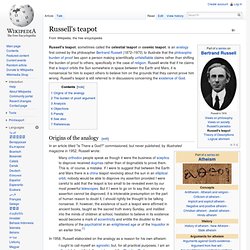
Russell wrote that if he claims that a teapot orbits the Sun somewhere in space between the Earth and Mars, it is nonsensical for him to expect others to believe him on the grounds that they cannot prove him wrong. Russell's teapot is still referred to in discussions concerning the existence of God. Origins of the analogy[edit] In an article titled "Is There a God? " commissioned, but never published, by Illustrated magazine in 1952, Russell wrote: In 1958, Russell elaborated on the analogy as a reason for his own atheism: I ought to call myself an agnostic; but, for all practical purposes, I am an atheist.
Ultimate Boeing 747 gambit. Atheist's Wager. One formulation of the Atheist's Wager suggests that one should live a good life without religion, since Martin writes that a loving and kind god would reward good deeds, and if no gods exist, a good person will leave behind a positive legacy.[1][2] The second formulation suggests that, instead of rewarding belief as in Pascal's wager, a god may reward disbelief, in which case one would risk losing infinite happiness by believing in a god unjustly, rather than disbelieving justly.[3] Explanation[edit] The Wager states that if you were to analyze your options in regard to how to live your life, you would come out with the following possibilities:[1][4][5]
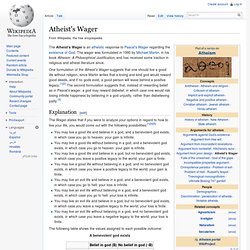
Problem of evil. In the philosophy of religion, the problem of evil is the question of how to reconcile the existence of evil with that of a deity who is, in either absolute or relative terms, omnipotent, omniscient, and omnibenevolent (see theism).[1][2] An argument from evil attempts to show that the co-existence of evil and such a deity is unlikely or impossible if placed in absolute terms.
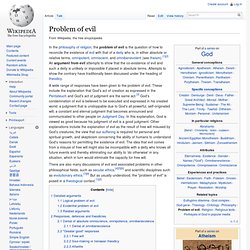
Attempts to show the contrary have traditionally been discussed under the heading of theodicy. A wide range of responses have been given to the problem of evil. These include the explanation that God's act of creation as expressed in the Pentateuch and God's act of judgment are the same act.[3] God's condemnation of evil is believed to be executed and expressed in his created world; a judgment that is unstoppable due to God's all powerful, self-originated will; a constant and eternal judgment that becomes announced and communicated to other people on Judgment Day.
Detailed arguments[edit] William L. Argument from free will. The argument from free will (also called the paradox of free will, or theological fatalism) contends that omniscience and free will are incompatible, and that any conception of God that incorporates both properties is therefore inherently contradictory.[1][2][3] The argument may focus on the incoherence of people having free will, or else God himself having free will.
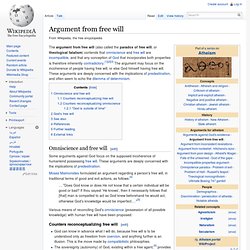
These arguments are deeply concerned with the implications of predestination, and often seem to echo the dilemma of determinism. Omniscience and free will[edit] If God made the game, its rules, and the players, then how can any player be free? Problem of Hell. The "problem of Hell" is an ethical problem related to some religions in which portrayals of Hell as a place where immortal souls are conscious are ostensibly cruel, and are thus inconsistent with the concepts of a just, moral and omnibenevolent God.[1] The problem of Hell revolves around four key points: Hell exists in the first place, some people go there, there is no escape, and it is punishment for actions or inactions done on Earth.[2] The belief that non-believers of a particular religion, or "the wicked" among believers, face damnation or destruction is called special salvation.
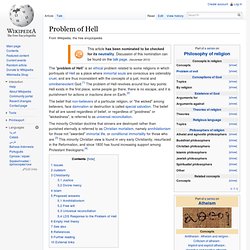
The belief that all are saved regardless of belief, or regardless of "goodness" or "wickedness", is referred to as universal reconciliation. Issues[edit] Argument from inconsistent revelations. Geographical distribution of major religions in the modern world The argument from inconsistent revelations, also known as the avoiding the wrong hell problem, is an argument against the existence of God.
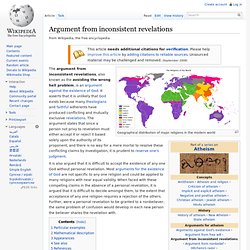
It asserts that it is unlikely that God exists because many theologians and faithful adherents have produced conflicting and mutually exclusive revelations. The argument states that since a person not privy to revelation must either accept it or reject it based solely upon the authority of its proponent, and there is no way for a mere mortal to resolve these conflicting claims by investigation, it is prudent to reserve one's judgment.
Argument from nonbelief. An argument from nonbelief is a philosophical argument that asserts an inconsistency between the existence of God and a world in which people fail to recognize him.
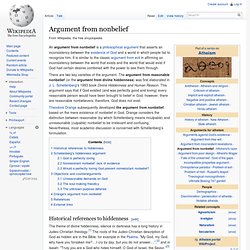
It is similar to the classic argument from evil in affirming an inconsistency between the world that exists and the world that would exist if God had certain desires combined with the power to see them through. There are two key varieties of the argument. The argument from reasonable nonbelief (or the argument from divine hiddenness) was first elaborated in J. L. Schellenberg's 1993 book Divine Hiddenness and Human Reason. Theological noncognitivism. Theological noncognitivism is the argument that religious language, and specifically words like God, are not cognitively meaningful.
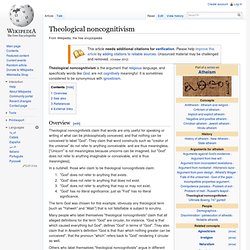
It is sometimes considered to be synonymous with ignosticism. Overview[edit] Theological noncognitivists claim that words are only useful for speaking or writing of what can be philosophically conceived, and that nothing can be conceived to label "God". They claim that word constructs such as "creator of the universe" do not refer to anything conceivable, and are thus meaningless. ["Unicorn" is not meaningless because unicorns can be imagined, but "God" does not refer to anything imaginable or conceivable, and is thus meaningless]. In a nutshell, those who claim to be theological noncognitivists claim: "God" does not refer to anything that exists. " The term God was chosen for this example, obviously any theological term [such as "Yahweh" and "Allah"] that is not falisifiable is subject to scrutiny.
George H. See also[edit] References[edit] External links[edit] Occam's razor. The sun, moon and other solar system planets can be described as revolving around the Earth.
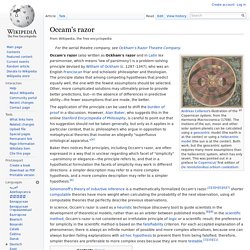
However that explanation's ideological and complex assumptions are completely unfounded compared to the modern consensus that all solar system planets revolve around the Sun. Ockham's razor (also written as Occam's razor and in Latin lex parsimoniae) is a principle of parsimony, economy, or succinctness used in problem-solving devised by William of Ockham (c. 1287 - 1347). It states that among competing hypotheses, the one with the fewest assumptions should be selected.
Other, more complicated solutions may ultimately prove correct, but—in the absence of certainty—the fewer assumptions that are made, the better. Solomonoff's theory of inductive inference is a mathematically formalized Occam's Razor:[2][3][4][5][6][7] shorter computable theories have more weight when calculating the probability of the next observation, using all computable theories which perfectly describe previous observations.
Omnipotence paradox. Argument from poor design. The dysteleological argument or argument from poor design is a dysteleological argument against the existence of God, specifically against the existence of a creator God (in the sense of a God that directly created all species of life).
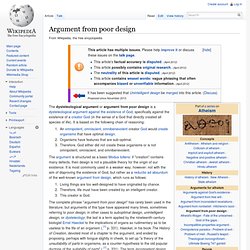
It is based on the following chain of reasoning: An omnipotent, omniscient, omnibenevolent creator God would create organisms that have optimal design.Organisms have features that are sub-optimal.Therefore, God either did not create these organisms or is not omnipotent, omniscient, and omnibenevolent. Fate of the unlearned. The fate of the unlearned (or destiny of the unevangelized) is an eschatological question about the ultimate destiny of people who have not been exposed to a particular theology or doctrine and thus have no opportunity to embrace it.